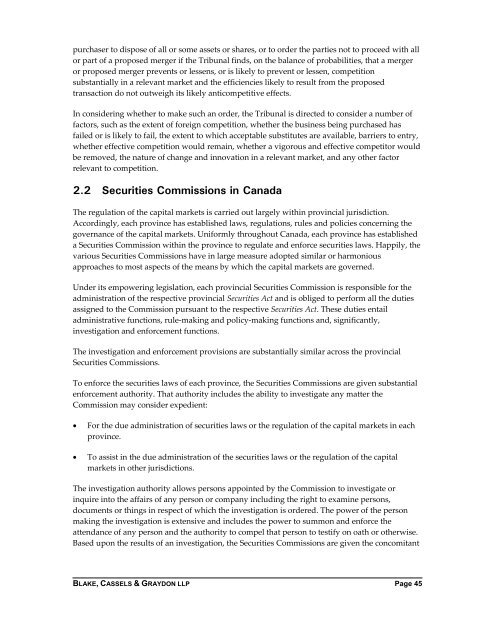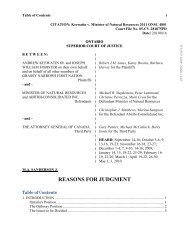Litigation and Dispute Resolution Guide
Litigation and Dispute Resolution Guide
Litigation and Dispute Resolution Guide
You also want an ePaper? Increase the reach of your titles
YUMPU automatically turns print PDFs into web optimized ePapers that Google loves.
purchaser to dispose of all or some assets or shares, or to order the parties not to proceed with allor part of a proposed merger if the Tribunal finds, on the balance of probabilities, that a mergeror proposed merger prevents or lessens, or is likely to prevent or lessen, competitionsubstantially in a relevant market <strong>and</strong> the efficiencies likely to result from the proposedtransaction do not outweigh its likely anticompetitive effects.In considering whether to make such an order, the Tribunal is directed to consider a number offactors, such as the extent of foreign competition, whether the business being purchased hasfailed or is likely to fail, the extent to which acceptable substitutes are available, barriers to entry,whether effective competition would remain, whether a vigorous <strong>and</strong> effective competitor wouldbe removed, the nature of change <strong>and</strong> innovation in a relevant market, <strong>and</strong> any other factorrelevant to competition.2.2 Securities Commissions in CanadaThe regulation of the capital markets is carried out largely within provincial jurisdiction.Accordingly, each province has established laws, regulations, rules <strong>and</strong> policies concerning thegovernance of the capital markets. Uniformly throughout Canada, each province has establisheda Securities Commission within the province to regulate <strong>and</strong> enforce securities laws. Happily, thevarious Securities Commissions have in large measure adopted similar or harmoniousapproaches to most aspects of the means by which the capital markets are governed.Under its empowering legislation, each provincial Securities Commission is responsible for theadministration of the respective provincial Securities Act <strong>and</strong> is obliged to perform all the dutiesassigned to the Commission pursuant to the respective Securities Act. These duties entailadministrative functions, rule-making <strong>and</strong> policy-making functions <strong>and</strong>, significantly,investigation <strong>and</strong> enforcement functions.The investigation <strong>and</strong> enforcement provisions are substantially similar across the provincialSecurities Commissions.To enforce the securities laws of each province, the Securities Commissions are given substantialenforcement authority. That authority includes the ability to investigate any matter theCommission may consider expedient:• For the due administration of securities laws or the regulation of the capital markets in eachprovince.• To assist in the due administration of the securities laws or the regulation of the capitalmarkets in other jurisdictions.The investigation authority allows persons appointed by the Commission to investigate orinquire into the affairs of any person or company including the right to examine persons,documents or things in respect of which the investigation is ordered. The power of the personmaking the investigation is extensive <strong>and</strong> includes the power to summon <strong>and</strong> enforce theattendance of any person <strong>and</strong> the authority to compel that person to testify on oath or otherwise.Based upon the results of an investigation, the Securities Commissions are given the concomitantBLAKE, CASSELS & GRAYDON LLP Page 45
















